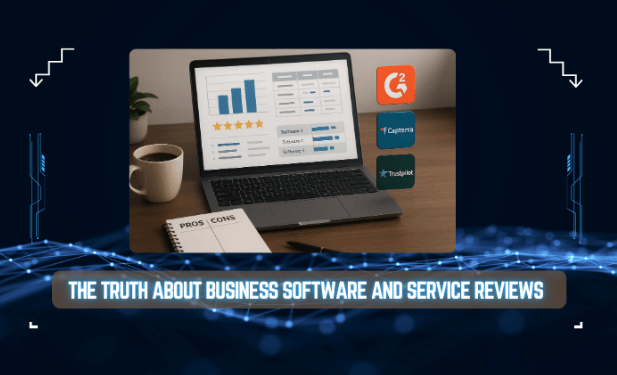Best Business Software and Service Reviews In Healthcare

If you work in a clinic or hospital, you already know how much the right software can make your day easier and how the wrong software can turn everything into confusion. From managing patient records to scheduling appointments and keeping up with regulations, healthcare relies on reliable tools. Therefore, business software and service reviews are useful.
They provide real feedback from people who have actually used the tools, not sales pitches, but honest pros and cons.
You can find out what works well, what is frustrating, and what is worth avoiding before spending a single rupee or dollar.
Healthcare software is not a one-size-fits-all. For example, clinics do not require the same system as a multi-specialty hospital.
Reviews help you see how each option performs in the real world so that you can choose something that actually fits your setup.
In this post, we will explore how to read these reviews effectively, what to focus on, and which software and services are currently earning the best feedback.
Why Reviews Matter So Much in Healthcare
In most industries, trying a new tool is merely an experiment. In healthcare, it’s a risk. You are handling sensitive patient data, billing information, and compliance rules, such as HIPAA. If your software fails or is difficult to use, it does not just waste time; it can impact care.
Therefore, healthcare teams rely heavily on business software and service reviews before purchasing. Reviews help you:
- Tools were compared based on real-world results.
- Learn about common bugs, support issues, and hidden costs.
- We will evaluate how effectively each system performs in a setting similar to yours.
Reading a few good reviews can save months of frustration.
How To Spot Reliable Software and Service Reviews
Not every online review is trustworthy. Some are too generic or are clearly paid promotions. When dealing with healthcare technology, accurate and specific feedback is required. Here is what to look for:
1. Verified users
Ensure that the review comes from someone who actually works in healthcare, such as doctors, nurses, or clinic managers. Many review platforms mark verified users, so you can filter out the fake ones.
2. Details that matter
Useful reviews go beyond “great software” or “bad experience.” They discussed things like:
- Ease of use
- Integration with other systems (EHR, billing, labs)
- Security and compliance
- Customer support quality
- Training and onboarding
3. Pros and cons
Balanced reviews are the most reliable. If every word is praise, it is probably marketing. Look for feedback that includes suggestions for improvement.
4. Consistency across platforms
If multiple review sites say the same thing, good or bad, it is likely to be accurate.
Top-Rated Healthcare Software and Services (Based on Reviews)
Here is a breakdown of the software and services that consistently receive positive mentions in business software and service reviews across the web.
1. Electronic Health Record (EHR) Systems
EHRs are the backbone of modern healthcare systems. The best ones streamline charting, prescriptions, and patient communication.
Commonly praised features include:
- Fast data entry
- Clean interface
- Reliable integrations with labs and pharmacies
What reviewers complain about:
- Migration pain when switching systems
- Extra fees for add-ons
- Long onboarding time
2. Practice Management and Billing Software
These tools handle the business side of things, including scheduling, claims, and payments.
Review highlights:
- Greatly reduced billing errors and no-show rates
- Time savings from automated claim tracking
- Reliable reporting tools for finances
Frequent complaints:
- Clunky reporting dashboards
- Delays with customer support
3. Telehealth and Remote Care Platforms
Remote care has exploded after 2020, and it is here to stay.
What reviewers love:
- Easy video consultations
- Smooth patient portals
- Strong encryption and privacy
What could be better:
- Occasional connection lag
- Limited integration with older EHRs
4. Healthcare Analytics and Business Intelligence Tools
Hospitals and clinics use analytical tools to track efficiency, patient outcomes, and costs.
Positive feedback:
- Clear dashboards
- Helpful data visualization
- Better decision-making for management
Downsides:
- Steep learning curve
- Expensive enterprise plans
5. Security and Compliance Services
Data protection is essential in healthcare.
Highly rated features:
- Automatic backups and audits
- HIPAA-compliant storage
- Fast incident response teams
Common issues:
- Complex setup
- Pricey for small practices
These categories appear in almost every healthcare tech review site, and reading through each helps narrow down what your clinic actually needs.
How To Use Reviews to Choose the Right Software
Reading reviews is one thing; using them well is another. Here’s a simple approach:
Step 1: Define your priorities
Before opening any review site, know what your clinic needs. Faster billing? Easier scheduling? Better patient communication
Step 2: Read with purpose
Do not get lost in five-star ratings. Instead, look for patterns. If 20 reviewers mention “poor training support,” it is probably a real issue.
Step 3: Shortlist your top options
Pick 3–5 tools that seem to fit your goals. Take note of what reviewers highlight—features, limitations, customer service, and pricing.
Step 4: Test them yourself
Request a free trial or demo. Use what the reviewers mentioned to test specific situations. We will check if it really works the way people describe.
Step 5: Plan for support
Even great tools come with a learning curve. Check how the company handles updates and customer concerns. Reviews provide information about their responsiveness.
Using reviews in this way turns them from casual reading into a real decision-making tool.
What Real Users Are Saying
Here is the kind of insight you will find in reviews:
“The appointment scheduling tool saves us hours every week. Even our older staff picked it up quickly.”
“Customer support was great during setup, but after that, response times slowed down.”
“Billing integration is smooth, but the reporting tools could use more flexibility.”
Comments like these tell you more than any product brochure could. They help you imagine how the software will fit into your daily workflow.
Common Complaints in Software Reviews (and How to Avoid Them)
Even top-rated healthcare tools have received criticism. Here are a few recurring issues that reviewers mention and how to avoid them.
- Integration issues: Vendors should be asked about the systems with which their software works. A simple “yes” is not enough—ask for examples.
- Hidden fees: Read the fine print for setup, support, or per-user charges.
- Poor training: If your staff does not receive sufficient training, even great software will feel like a burden.
- Slow updates or downtime: Check reviews for mentions of performance issues or delays in support.
- Overly complicated features: Some software attempts to do too much. Focus on what solves your actual problems.
A few minutes spent reading about other users’ pain points can save you from repeating them.
Emerging Trends In Healthcare Software Reviews
Review trends change as technology changes. The following are becoming more common in recent business software and service reviews:
- AI-powered documentation: Doctors love tools that auto-generate notes from consultations.
- Better interoperability: Tools that easily connect with laboratory and pharmacy systems are receiving higher ratings.
- Patient-centric design: Reviews praise platforms that make things easier for patients, not just staff.
- Data security focus: After a few high-profile breaches, more reviewers are discussing how software protects information.
- Mobile access: The ability to manage records or appointments securely from a phone is a must-have feature.
If you are comparing software today, pay attention to how users talk about these areas. They are shaping what “best in class” will mean in the next few years.
Final Thoughts: Turn Reviews Into Smarter Decisions
Buying healthcare software or services is a significant commitment. You do not want to be stuck with something that sounds good in a demo but slows you down later. Therefore, it is worth taking the time to explore business software and service reviews before making a decision.
Here is what to remember:
- Look for reviews written by real healthcare professionals.
- Focus on detailed and balanced feedback.
- Use multiple review platforms to obtain a clearer picture.
- Always test before purchasing.
The goal is not just to find “the best” tool but to find the right one for your team. This tool helps you work faster, stay compliant, and focus more on your patients.
If you take reviews seriously and match them to your clinic’s needs, you will make a smarter investment and set yourself up for smoother and more efficient healthcare operations.
FAQ: Business Software and Service Reviews in Healthcare
1. What is the difference between business and healthcare software?
Business software handles general operations, whereas healthcare software manages patient records, billing, and compliance.
2. How often should clinics review their software?
Most practices reassess every 3–5 years or when updates and new rules make the current tools outdated.
3. Where can I find trusted software reviews?
Check verified sites for healthcare-focused reviews.
4. Are free healthcare tools reliable?
They are suitable for small clinics, but reviews often mention limitations, such as fewer features or weak support.
5. What is a major red flag in a review?
Repeated complaints about poor customer support — in healthcare, that’s a dealbreaker.





